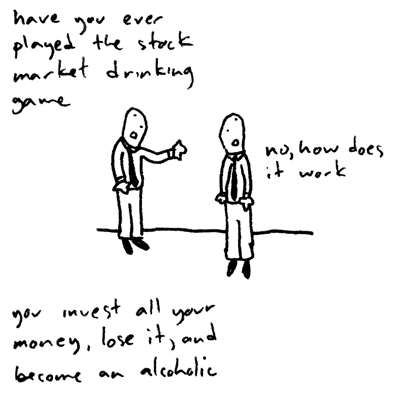
so, i was pondering upon what i could write my blog on this fine week, and was informed that the city hired a few new people to work this summer because some of the people who worked last year decided not to return for another summer.
upon hearing this i began a small bit of remeniscing which gave me an idea as to what to write about for this blog.
last summer i was hired by the fort parks department as a seasonal employee because the city is a little short handed with all of the summer activities and increased use of parks and playgrounds etc. to sum up my job, i pick up trash and get baseball diamonds ready for games. i do this work with anywhere between 0 and 3 other people depending on the time of day and time of the summer. when i thought about this more, it dawned on me that it was a prime example of diminishing marginal product.
at the beginning of the summer it was myself and one other person in the morning working on 'doing rounds' (thats how we refer to checking/changing all the trash cans around the various parks) with one other joining us in the afternoon to get all of the 5 baseball diamonds ready for the games to be held in the evening.
with just the two of us working in the morning we would finish doing rounds by approximately 830 in the morning. we would finish the first two baseball diamonds by noon, and when the last person would join us we would finish the last 3 diamonds in the afternoon.
later on in the summer, another guy joined us, making the grand total 3 workers in the morning and 4 in the afternoon. our workload did increase, but only to what we could still manage to do in one day. that increase was only 2 extra baseball diamonds a day.
so, if you do the math, we went from having 2 people for 4 parks worth of rounds to 3 people, decreasing the average number from 2parks/person to 1 and 1/3 parks/person. we also went from 3 people doing 5 diamonds to 4 doing 7. an average of 1.66 diamonds/person to an average of 1.75 diamonds/person. so for average total work, we went from 3.66 parks/person to 3 parks/person. (1 parks worth of 'rounds' is worth approximately the same amount of work as preping 1 baseball diamond).
so with the extra person, none of us was actually as productive as before. if you need further proof of DMP in the parks department, simply look at how long it took for us to do things. when it was just hte two of us working we would finish rounds by about 830. with three people, we wouldn't finish rounds until close to 930 (w/a 15minute break @ 845).
yea, i know its been kinda a theme in my blogs/comments, but i still think its real cool how you can find econ in just about everything. so i just thought i'd share this little epiphany with the rest of you.






